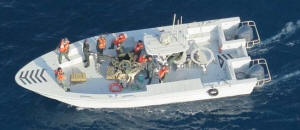|
Iran says it won't wage war, U.S. deploys
more troops to Middle East
 Send a link to a friend
Send a link to a friend
 [June 18, 2019]
By Babak Dehghanpisheh and Sylvia Westall [June 18, 2019]
By Babak Dehghanpisheh and Sylvia Westall
GENEVA/DUBAI (Reuters) - President Hassan
Rouhani said on Tuesday Iran would not wage war against any nation,
sounding a note of restraint after the United States announced more
troop deployments to the Middle East.
Fears of a confrontation between Iran and its long-time foe the United
States have mounted since Thursday when two oil tankers were attacked
near the strategic Strait of Hormuz shipping lane, which Washington
blamed on Tehran.
Iran denied involvement in the attacks and said on Monday it would soon
breach limits on how much enriched uranium it can stockpile under a 2015
nuclear deal, which had sought to limit its nuclear capabilities.
Exceeding the uranium cap at the heart of the accord would prompt a
diplomatic crisis, forcing the other signatories, which include China,
Russia and European powers, to confront Iran.
The standoff drew a call for caution from China. Its top diplomat warned
that the world should not open a "Pandora's Box" in the Middle East, as
he denounced U.S. pressure on Iran and called on it not to drop out of
the landmark nuclear deal.
Russia urged restraint on all sides.

In a speech, Rouhani dismissed U.S. efforts to isolate Iran as
unsuccessful and suggested the U.S. administration of President Donald
Trump was inexperienced in international affairs.
But he said Iran did not seek conflict.
"Iran will not wage war against any nation," Rouhani said in a speech
broadcast live on state TV. "Despite all of the Americans' efforts in
the region and their desire to cut off our ties with all of the world
and their desire to keep Iran secluded, they have been unsuccessful."
On Monday, Iranian officials made several assertive comments about
security, including the secretary of Iran's Supreme National Security
Council, Ali Shamkhani, who said Tehran was responsible for security in
the Gulf and urged U.S. forces to leave the region.
SANCTIONS TIGHTENED
Acting U.S. Defense Secretary Patrick Shanahan on Monday announced the
deployment of about 1,000 more troops to the Middle East for what he
said were defensive purposes, citing concerns about a threat from Iran.
The new U.S. deployment is in addition to a 1,500-troop increase
announced last month in response to tanker attacks in May. Washington
previously tightened sanctions, ordering all countries and companies to
halt imports of Iranian oil or be banished from the global financial
system.
Iran's announcement on Monday that it would soon breach limits on how
much enriched uranium it can stockpile under the deal was denounced by a
White House National Security Council spokesman as "nuclear blackmail."
[to top of second column]
|

A U.S. military image released by the Pentagon in Washington on June
17, shows what the Pentagon says are members of the Islamic
Revolutionary Guard Corps Navy photographed from a U.S. Navy MH-60R
helicopter after removing an unexploded limpet mine from the M/T
Kokuka Courageous, a Japanese owned commercial motor tanker, after
it was attacked with another mine which did explode on June 13,
2019. U.S. Navy/Handout via REUTERS

The move further undermines the nuclear pact, but Rouhani said on
Monday the collapse of the deal would not be in the interests of the
region or the world.
The nuclear deal seeks to head off any pathway to an Iranian nuclear
bomb in return for the removal of most international sanctions.
Speaking in Beijing, Chinese State Councillor Wang Yi said the
United States should not use "extreme pressure" to resolve issues
with Iran.
CHINA "VERY CONCERNED"
Wang told reporters China, a close energy partner of Iran, was "of
course, very concerned" about the situation in the Gulf and with
Iran, and called on all sides to ease tension.
"We call on all sides to remain rational and exercise restraint, and
not take any escalatory actions that irritate regional tensions, and
not open a Pandora's box," Wang said.
"In particular, the U.S. side should alter its extreme pressure
methods," Wang said. "Any unilateral behavior has no basis in
international law. Not only will it not resolve the problem, it will
only create an even greater crisis."
Wang also said the Iran nuclear deal was the only feasible way to
resolve its nuclear issue, and urged Iran to be prudent.
European Union foreign policy chief Federica Mogherini said the EU
would only react to any breach if the International Atomic Energy
Agency formally identified one.
The Trump administration says the deal, negotiated by Democratic
President Barack Obama, was flawed as it is not permanent, does not
address Iran's missile program and does not punish it for waging
proxy wars in other Middle East countries.

(Additional reporting by Alexander Cornwell in Dubai, Tom Balmforth
and Maxim Rodionov in Moscow, Ben Blanchard in Beijing, Writing by
William Maclean, Editing by Janet Lawrence)
[© 2019 Thomson Reuters. All rights
reserved.]
Copyright 2019 Reuters. All rights reserved. This material may not be published,
broadcast, rewritten or redistributed.
Thompson Reuters is solely responsible for this content. |